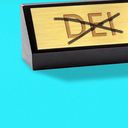“DEI” has become a weaponized term. Now, corporate America is backing away from it

Laudable goals like achieving "equity" and "diversity" and making people feel "included" have become weaponized terms, and now corporate America is navigating the minefield.
Why it matters: The year ahead will be pivotal for corporate diversity efforts, as attacks against DEI — diversity, equity and inclusion — will likely intensify.
- But for many employers, maintaining a diverse workforce where employees feel included is a key part of attracting and retaining workers (particularly in a tight labor market).
Catch up fast: It's been a long strange trip for corporate diversity efforts — which can range from employee resource groups, to anti-bias trainings, to hiring programs.
- For years, DEI was criticized for being ineffective corporate window dressing or for being counterproductive — but more recently, conservative politicians and pundits have made DEI a target, with new laws limiting its practice cropping up in Florida and Texas.
- Ousted Harvard President Claudine Gay's commitment to DEI was part of the reason she faced such strong criticism from the right.
- DEI funding and staffing flailed last year, after a two year boom in the wake of the protests that followed the murder of George Floyd in 2020.
Meanwhile: The Supreme Court's decision last year overturning the use of affirmative action in universities has drawn attention to corporate diversity efforts.
- Businesses are trying to avoid any programs that could draw legal scrutiny — any kinds of goals around hiring particular demographic groups are increasingly frowned upon.
- "Anything that smacks of a quota" is out, said Diana Scott, Human Capital Center Leader at The Conference Board.
The intrigue: At the same time, many business leaders say they're still committed to diversity. In a survey of chief human resource officers recently conducted by The Conference Board, zero respondents said they were planning on scaling back DEI in 2024.
State of play: This all means that the way DEI happens inside companies is changing.
- Some firms, like Blackstone, are focusing on hiring for socioeconomic diversity, and on changing job requirements to find more diverse talent without targeting a specific race or ethnicity, Fortune recently reported.
- And businesses are pulling back from the DEI term. The focus is moving away from "those three words" towards efforts around "wellbeing and inclusion," said Scott from The Conference Board.
- "Companies are really starting to look at other ways to do the work without saying that they're doing the work," said Cinnamon Clark, cofounder of Goodwork Sustainability, a DEI consulting firm.
- Businesses will likely be talking more about "employee experience" or "wellness," which falls under the inclusion bucket, said Clark.
The big picture: DEI proponents are optimistic that employers can still foster diverse and inclusive workforces in this environment — but it's a tough case to make.
- "It's hard to imagine with the amped up rhetoric of an election year that people really want to stick out their neck more," said Kevin Delaney, co-founder of Charter, a future-of-work media and research company.
- He thinks responsibility for these efforts will fall down the ladder to front-line managers.
- The "danger" is that DEI becomes so watered down that you can't actually do the work, said Sean Edmund Rogers, dean of the college of business at the University of Rhode Island and its former chief diversity officer.
What to watch: Cutbacks in DEI could lead to a decline in diversity in organizations. One recent study found that companies with DEI teams make more diverse hires and have higher levels of employee morale.